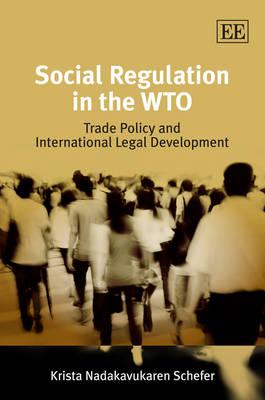Full Product Details
Author: Krista Nadakavukaren Schefer
Publisher: Edward Elgar Publishing Ltd
Imprint: Edward Elgar Publishing Ltd
Dimensions:
Width: 15.60cm
, Height: 2.30cm
, Length: 23.40cm
Weight: 0.626kg
ISBN: 9781848449596
ISBN 10: 1848449593
Pages: 336
Publication Date: 31 March 2010
Audience:
Professional and scholarly
,
Professional & Vocational
Format: Hardback
Publisher's Status: Active
Availability: To order

Stock availability from the supplier is unknown. We will order it for you and ship this item to you once it is received by us.
Reviews
'Recourse to restrictions of international trade for the promotion of non-economical goals is at the heart of international trade regulation. This book offers a fresh, broad, but equally detailed analysis of such restrictions. It places WTO law in the broader framework of public international law and explores new ways and means as to how tensions and conflict in the pursuit of non-economic policy goals should be addressed. It is essential reading for all seeking answers beyond the existing framework of WTO law and policies.' - Thomas Cottier, World Trade Institute, University of Bern, Switzerland and Institute of European and International Economic Law 'This book presents a thoughtful and very readable analysis of social trade regulationA"", that is, the use of border measures for non-trade purposes. The study examines how such measures are regarded in international law and in the more specialized law of the World Trade Organization. After she concludes that such unilateral measures may often be illegal under trade law, Professor Schefer's original contribution to the debate is to unpack that unlawful status into the categories of law-disablingA"", law-supportingA"", and law-creatingA"" trade regulation. Through a careful exposition of these concepts, the book shows ways in which social trade regulation can improve the progress of the international community.' - Steve Charnovitz, The George Washington University, US
'Recourse to restrictions of international trade for the promotion of non-economical goals is at the heart of international trade regulation. This book offers a fresh, broad, but equally detailed analysis of such restrictions. It places WTO law in the broader framework of public international law and explores new ways and means as to how tensions and conflict in the pursuit of non-economic policy goals should be addressed. It is essential reading for all seeking answers beyond the existing framework of WTO law and policies.' - Thomas Cottier, World Trade Institute, University of Bern, Switzerland and Institute of European and International Economic Law 'This book presents a thoughtful and very readable analysis of social trade regulationA , that is, the use of border measures for non-trade purposes. The study examines how such measures are regarded in international law and in the more specialized law of the World Trade Organization. After she concludes that such unilateral measures may often be illegal under trade law, Professor Schefer's original contribution to the debate is to unpack that unlawful status into the categories of law-disablingA , law-supportingA , and law-creatingA trade regulation. Through a careful exposition of these concepts, the book shows ways in which social trade regulation can improve the progress of the international community.' - Steve Charnovitz, The George Washington University, US
Author Information
Krista Nadakavukaren Schefer, Vice Director of the Legal Division, Swiss Institute of Comparative Law, Lausanne, Switzerland




